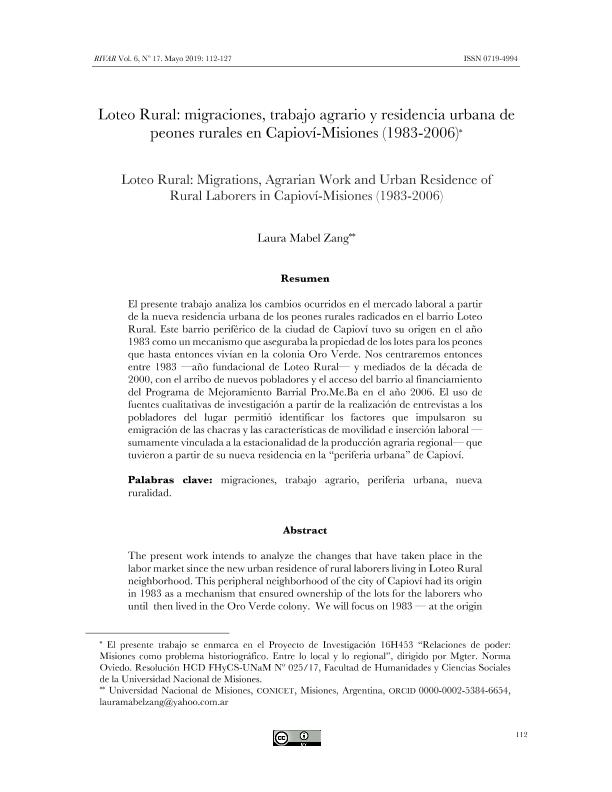Mostrar el registro sencillo del ítem
dc.contributor.author
Zang, Laura Mabel

dc.date.available
2020-06-23T21:00:18Z
dc.date.issued
2019-05
dc.identifier.citation
Zang, Laura Mabel; Loteo Rural: migraciones, trabajo agrario y residencia urbana de peones rurales en Capioví-Misiones (1983-2006); Universidad de Santiago de Chile. Instituto de Estudios Avanzados; Rivar; 6; 17; 5-2019; 112-127
dc.identifier.issn
0719-4994
dc.identifier.uri
http://hdl.handle.net/11336/108048
dc.description.abstract
El presente trabajo analiza los cambios ocurridos en el mercado laboral a partir de la nueva residencia urbana de los peones rurales radicados en el barrio Loteo Rural. Este barrio periférico de la ciudad de Capioví tuvo su origen en el año 1983 como un mecanismo que aseguraba la propiedad de los lotes para los peones que hasta entonces vivían en la colonia Oro Verde. Nos centraremos entonces entre 1983 —año fundacional de Loteo Rural— y mediados de la década de 2000, con el arribo de nuevos pobladores y el acceso del barrio al financiamiento del Programa de Mejoramiento Barrial Pro.Me.Ba en el año 2006. El uso de fuentes cualitativas de investigación a partir de la realización de entrevistas a los pobladores del lugar permitió identificar los factores que impulsaron su emigración de las chacras y las características de movilidad e inserción laboral — sumamente vinculada a la estacionalidad de la producción agraria regional— que tuvieron a partir de su nueva residencia en la “periferia urbana” de Capioví.
dc.description.abstract
The present work intends to analyze the changes that have taken place in the labor market since the new urban residence of rural laborers living in Loteo Rural neighborhood. This peripheral neighborhood of the city of Capioví had its origin in 1983 as a mechanism that ensured ownership of the lots for the laborers who until then lived in the Oro Verde colony. We will focus on 1983 — at the origin of Loteo Rural — and the middle of the 2000s with the arrival of new settlers and the access of the neighborhood to the financing of the Barrier Improvement Program Pro.Me.Ba in 2006. The use of qualitative research sources based on interviewing local people allowed us to identify the factors that led to their migration from the farms and the characteristics of the forms of mobility and labor insertion — very related to seasonality of the agricultural production of the region — that they had from their new residence in the “urban periphery” of Capioví.
dc.format
application/pdf
dc.language.iso
spa
dc.publisher
Universidad de Santiago de Chile. Instituto de Estudios Avanzados
dc.rights
info:eu-repo/semantics/openAccess
dc.rights.uri
https://creativecommons.org/licenses/by-nc-sa/2.5/ar/
dc.subject
migraciones
dc.subject
trabajo agrario
dc.subject
periferia urbana
dc.subject
nueva ruralidad
dc.subject.classification
Geografía Cultural y Económica

dc.subject.classification
Geografía Económica y Social

dc.subject.classification
CIENCIAS SOCIALES

dc.title
Loteo Rural: migraciones, trabajo agrario y residencia urbana de peones rurales en Capioví-Misiones (1983-2006)
dc.title
Loteo Rural: Migrations, Agrarian Work and Urban Residence of Rural Laborers in Capioví-Misiones (1983-2006)
dc.type
info:eu-repo/semantics/article
dc.type
info:ar-repo/semantics/artículo
dc.type
info:eu-repo/semantics/publishedVersion
dc.date.updated
2020-05-11T13:54:08Z
dc.journal.volume
6
dc.journal.number
17
dc.journal.pagination
112-127
dc.journal.pais
Chile

dc.journal.ciudad
Santiago de Chile
dc.description.fil
Fil: Zang, Laura Mabel. Consejo Nacional de Investigaciones Científicas y Técnicas. Centro Científico Tecnológico Conicet - Nordeste; Argentina. Universidad Nacional de Misiones. Facultad de Humanidades y Ciencias Sociales. Secretaría de Investigación y Postgrado. Programa de Postgrado en Antropología Social; Argentina
dc.journal.title
Rivar
dc.relation.alternativeid
info:eu-repo/semantics/altIdentifier/url/http://revistarivar.cl/images/vol6-n17/art07_RIVAR17.pdf
Archivos asociados
